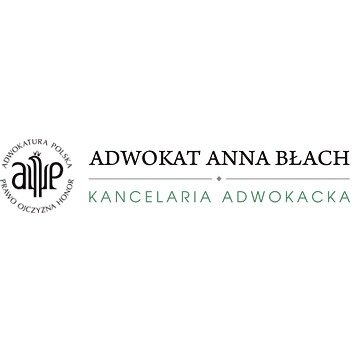Best Debt & Collection Lawyers in Poland
Share your needs with us, get contacted by law firms.
Free. Takes 2 min.
Or refine your search by selecting a city:
List of the best lawyers in Poland
About Debt & Collection Law in Poland
Debt and collection law in Poland is a complex field that governs the relationship between creditors and debtors. It involves the legal principles that relate to the collection of debts, including the conditions under which debt collection agencies operate, the rights of debtors, and the obligations of creditors. The law aims to balance the interests of creditors in recovering their dues while protecting debtors from unfair, aggressive, or unethical collection practices. Poland has adopted frameworks consistent with European Union regulations, promoting transparency and fairness in debt recovery processes.
Why You May Need a Lawyer
There are several situations where individuals or businesses might need legal assistance in the field of debt and collection in Poland:
- When you are facing aggressive or unlawful debt recovery tactics by creditors or collection agencies.
- If you need advice on contesting a debt or addressing possible errors in the amount claimed.
- To negotiate repayment terms with creditors and prevent escalation to legal action.
- If you are a creditor seeking to enforce a debt claim and need guidance on the legal procedures involved.
- In cases of insolvency or bankruptcy where legal expertise is needed to navigate complex processes.
Local Laws Overview
The legal framework governing debt and collection in Poland is primarily laid out in the Civil Code and the Law on Banking, among other statutes. Key aspects include:
- Statute of Limitations: Most debts have a statute of limitations, typically three years, but this can vary depending on the type of debt.
- Consumer Protection: Regulations prohibit unfair practices and mandate clear communication from collection agencies.
- Court Proceedings: Creditors may need to obtain a court order to enforce debt collection, particularly if the debtor disputes the amount owed.
- Bankruptcy Law: Provides a framework for insolvency proceedings, allowing the restructuring of debt for individuals and businesses.
- Data Protection: Debt collectors must adhere to data protection laws, ensuring that debtor information is handled appropriately.
Frequently Asked Questions
What rights do I have as a debtor in Poland?
Debtors in Poland have several rights, including the right to clear information about their debts, protection from unethical collection practices, and the right to contest incorrect claims. They're also entitled to a reasonable notice period before legal action is initiated.
Can debt be collected after the statute of limitations expires?
No, once the statute of limitations has expired, creditors cannot legally enforce debt collection through the courts. However, they might still attempt collection through other means.
How can I verify if a collection agency is legitimate?
You can verify a collection agency by checking their registration with the relevant authorities in Poland and researching any reviews or complaints about them from other consumers.
What should I do if I cannot pay my debt?
If you cannot meet your debt obligations, it is advisable to contact the creditor to negotiate a repayment plan. You may also consider seeking legal advice to explore other options, such as debt restructuring.
What actions are considered unfair debt collection practices?
Harassment, threats, misrepresentation, and providing false information are considered unfair practices. Polish law prohibits these actions, and debtors can report such behavior to the appropriate authorities.
Can a creditor take legal action without notifying me?
No, creditors must provide adequate notice and an opportunity to settle the debt before initiating legal action.
What happens if I ignore a debt collection notice?
Ignoring a debt collection notice can lead to legal action, including court proceedings to obtain a debt enforcement order. It's best to address these notices promptly and seek legal advice if needed.
Is it possible to dispute a debt once a court order is issued?
Yes, you can dispute a debt even after a court order, but it usually requires presenting new evidence or demonstrating that the original proceedings were flawed.
What are the consequences of filing for bankruptcy in Poland?
Bankruptcy in Poland can lead to the restructuring or discharge of debts, but it may also impact personal credit, business operations, and asset ownership. Legal advice is crucial to understand all implications.
How can I protect my personal data during debt collection?
Ensure that any collection agency you deal with complies with data protection laws, and do not provide unnecessary personal information. Report any breaches to the appropriate authorities.
Additional Resources
For further assistance, consider reaching out to the following resources:
- Polish Financial Supervision Authority (KNF): Offers guidelines and oversight for financial practices.
- Consumer Ombudsman: Provides support and advice for consumers facing unfair practices.
- Legal Aid Clinics: Many universities offer free legal consultations to those in need.
- Non-governmental Organizations: Groups such as the Polish Consumers Association provide advice and support for debt issues.
Next Steps
If you need legal assistance in debt and collection matters, consider the following steps:
- Consult a Lawyer: Seek out a legal professional specializing in debt & collection for personalized advice.
- Gather Documentation: Collect relevant documents, including contracts, notices, and correspondence related to the debt.
- Contact Consumer Protection Agencies: If experiencing unfair practices, report the issue to the Consumer Ombudsman.
- Stay Informed: Continuously educate yourself on your rights and obligations under Polish law to better protect your interests.
Lawzana helps you find the best lawyers and law firms in Poland through a curated and pre-screened list of qualified legal professionals. Our platform offers rankings and detailed profiles of attorneys and law firms, allowing you to compare based on practice areas, including Debt & Collection, experience, and client feedback.
Each profile includes a description of the firm's areas of practice, client reviews, team members and partners, year of establishment, spoken languages, office locations, contact information, social media presence, and any published articles or resources. Most firms on our platform speak English and are experienced in both local and international legal matters.
Get a quote from top-rated law firms in Poland — quickly, securely, and without unnecessary hassle.
Disclaimer:
The information provided on this page is for general informational purposes only and does not constitute legal advice. While we strive to ensure the accuracy and relevance of the content, legal information may change over time, and interpretations of the law can vary. You should always consult with a qualified legal professional for advice specific to your situation.
We disclaim all liability for actions taken or not taken based on the content of this page. If you believe any information is incorrect or outdated, please contact us, and we will review and update it where appropriate.
Browse debt & collection law firms by city in Poland
Refine your search by selecting a city.
















